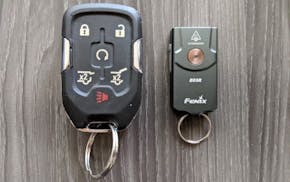Q: I'm a senior with a 2001 Buick LeSabre with 73,000 miles. It has a habit of hard starting when the engine is warm. It went through two independent shops and one dealer. The first replaced the temperature sensor, the air filter, spark plugs and wires. The second replaced the idle switch, mass airflow sensor and air temperature sensor and cleaned the throttle. The dealer replaced the air filter and cleaned the fuel injectors. I still have the same problem. I'm on Supplemental Security Income and can't afford a new car, let alone being taken for a ride.
E.Y., Bolingbrook, Ill.
A: When is the last time you filled your tank? That may sound weird, but some vehicles may still have sufficient winter blend gas in the tank to cause countless drivability problems as soon as the weather warms up. Since you seem to drive less than 5,000 miles a year, your car may be a prime candidate. Taken for a ride? We think not. But it bothers us no end when shops just throw stuff at the car in hopes of fixing the problem. How would they like it if their doctor did the same?
Q: I own a 2015 Honda Accord with 11,000 miles. Recently I noticed that the rear backup camera was loose and wiggled when you moved it. When I brought the Accord to the dealership service department, I was told that the repair/replacement would not be covered by the manufacturer's warranty or the extended protection plan for which I paid extra. They couldn't replace the mount alone; they had to replace the entire camera and mount together. Second, the service adviser told me that "a lot of these break. It's due to the carwash." Have you ever heard of rear backup cameras breaking because of going through a carwash?
P.A., Delray Beach, Fla.
A: Although we are unaware of routine damage due to car washes, that does not mean it could not happen. Although unlikely, careless customers or employees might back the car into the one behind or rear-end the vehicle in front. Carmakers extensively test nearly everything before releasing the car for sale. They test the outside mirrors, antennas, hoods and trunk lids and so on. Most subject the vehicles to rain chambers to make sure there are no leaks. Carmakers consult with car wash manufacturers to be sure that the wheels and tires will not be damaged by the car wash guides. Careless drivers in parking lots present a greater problem.
Q: I suspect you'll receive other inquiries like this after a recent letter and your answer: Where is the "black box" located? Can it be disconnected by the consumer? Will it harm the vehicle's computer if it is disabled or removed? Are there any laws prohibiting disabling the black box?
B.R., Crystal Lake, Ill.
A: What many of us call the black box is the event data recorder. Different carmakers install them in different locations. Often they are located under the passenger seat or somewhere behind the dash. Disconnecting it may impair some other system. Although we are unaware of any federal or state laws preventing it, we would suggest that you don't. Some states limit what insurance companies can obtain while others require law enforcement to obtain a search warrant before tapping into the car's data link to download the info. If switching the EDR off becomes an option, insurance companies may hike rates for those who do so.
Bob Weber is a writer and mechanic who became an ASE-certified Master Automobile Technician in 1976. He maintains this status by seeking certification every five years. Weber's work appears in professional trade magazines and other consumer publications. His writing also appears in automotive trade publications, Consumer Guide and Consumers Digest. Send automotive questions along with name and town to motormouth.tribverizon.net.



